By Euronews with AFP/AP • Updated: 13/08/2022 -
.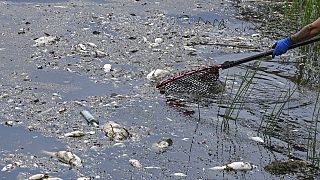
Volunteers recover dead fish from the water of the German-Polish border river Oder in Lebus, eastern Germanny, Saturday, Aug. 13, 2022. -

Volunteers recover dead fish from the water of the German-Polish border river Oder in Lebus, eastern Germanny, Saturday, Aug. 13, 2022. -
Copyright Patrick Pleul/(c) Copyright 2022, dpa (www.dpa.de). Alle Rechte vorbehalten

Speculation is growing over the cause of an "environmental disaster" in Germany and Poland, following a mass fish die-off in the river Oder.
Thousands of lifeless fish began washing up on the banks of the river Oder, running along the borders of Germany and Poland, at the end of July.
Since then, officials have tried to determine the cause of the mass die-off, which they say will take years to recover from as the river is damaged so badly.
Laboratory tests into the source of the disaster have not detected mercury, Poland’s environment minister said Saturday.
Authorities believe the fish were likely poisoned.
Polish Prime Minister Mateusz Morawiecki said Friday that “huge amounts of chemical waste” were probably dumped into his country's second-longest river.
He vowed to do everything possible to limit the environmental devastation, with Poland's interior minister later offering a reward of 1 million zlotys ($200,000) to anyone with information on who was responsible for polluting the river.
Anna Moskwa, the minister of climate and environment, said analyses of river samples taken in both Poland and Germany revealed elevated salt levels.
Comprehensive toxicology studies are still underway in Poland, she said.
Writing on Twitter, Moskwa said test results transmitted from Germany had so far not shown a high presence of mercury.
The death of the fish is "atypical," said Axel Vogel, Minister of the Environment for the German state of Brandenburg, estimating that "tons" of fish have probably already perished.
“The extent of the fish die-off is shocking. This is a blow to the Oder as a waterway of great ecological value, from which it will presumably not recover for a long time,” he said.
Fish die-offs are often caused by the distortion of oxygen levels when the water level is too low. This is the case in Germany and Poland, amid the historic drought gripping Europe.
“But we have noticed an increase in the oxygen level for several days, which indicates that a foreign substance has been introduced and caused all this," said Vogel.
Speculation is growing over the cause of an "environmental disaster" in Germany and Poland, following a mass fish die-off in the river Oder.
Thousands of lifeless fish began washing up on the banks of the river Oder, running along the borders of Germany and Poland, at the end of July.
Since then, officials have tried to determine the cause of the mass die-off, which they say will take years to recover from as the river is damaged so badly.
Laboratory tests into the source of the disaster have not detected mercury, Poland’s environment minister said Saturday.
Authorities believe the fish were likely poisoned.
Polish Prime Minister Mateusz Morawiecki said Friday that “huge amounts of chemical waste” were probably dumped into his country's second-longest river.
He vowed to do everything possible to limit the environmental devastation, with Poland's interior minister later offering a reward of 1 million zlotys ($200,000) to anyone with information on who was responsible for polluting the river.
Anna Moskwa, the minister of climate and environment, said analyses of river samples taken in both Poland and Germany revealed elevated salt levels.
Comprehensive toxicology studies are still underway in Poland, she said.
Writing on Twitter, Moskwa said test results transmitted from Germany had so far not shown a high presence of mercury.
The death of the fish is "atypical," said Axel Vogel, Minister of the Environment for the German state of Brandenburg, estimating that "tons" of fish have probably already perished.
“The extent of the fish die-off is shocking. This is a blow to the Oder as a waterway of great ecological value, from which it will presumably not recover for a long time,” he said.
Fish die-offs are often caused by the distortion of oxygen levels when the water level is too low. This is the case in Germany and Poland, amid the historic drought gripping Europe.
“But we have noticed an increase in the oxygen level for several days, which indicates that a foreign substance has been introduced and caused all this," said Vogel.
Michel Tautenhahn, deputy head of the German Oder Valley National Park, said that more than just fish have been caught up in the disaster.
"I am deeply shocked," he told reporters. "I feel like I see decades of work being ruined ... Water is our life."
Tautenhahn said that a host of other marine animals, such as mussels had also succumbed.
"Fish are] just the tip of the iceberg," he said.
The Oder has been considered a relatively clean river for many years, supporting around 40 species of fish.
In Poland, authorities have been accused of a sluggish reaction, after reports of huge numbers of dead fish washing ashore began surfacing.
Two Polish officials were dismissed for what the country's prime minister described as tardiness in their response.
“If I come to the conclusion that there was a serious breach of duties, further consequences will be drawn,” he said.
“For me, however, the most important thing is to deal with this ecological disaster as soon as possible, because nature is our common heritage. It is a national good," Morawiecki said.
‘Dead fish everywhere’ in German-Polish river after suspected chemical waste dump
Thousands of fish wash up dead on banks of Oder river, as Berlin warns of ‘environmental disaster’ and accuses Warsaw of failing to take timely action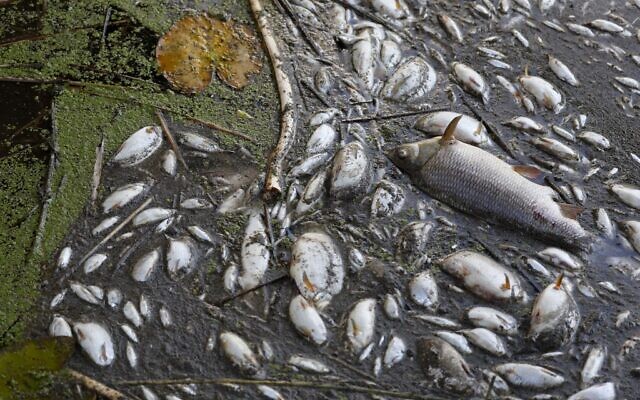
Dead fish on the banks of the river Oder in Schwedt, eastern Germany, on August 12, 2022, after a massive fish kill was discovered in the river in the eastern federal state of Brandenburg, close to the border with Poland. (Photo by Odd ANDERSEN / AFP)
SCHWEDT, Germany (AFP) — Thousands of fish have washed up dead on the Oder river running through Germany and Poland, sparking warnings of an environmental disaster as residents are urged to stay away from the water.
The fish floating by the German banks near the eastern town of Schwedt are believed to have washed upstream from Poland, where first reports of mass fish deaths were made by locals and anglers as early as July 28.
German officials accused Polish authorities of failing to inform them about the deaths, and were taken by surprise when the wave of lifeless fish came floating into view.
In Poland, the government has also come under heavy criticism for failing to take swift action.
Almost two weeks after the first dead fish appeared floating by Polish villages, Polish Prime Minister Mateusz Morawiecki said on Friday that “everyone had initially thought that it was a local problem.”
Get The Times of Israel's Daily Editionby email and never miss our top stories
Newsletter email addressGET IT
By signing up, you agree to the terms
But he admitted that the “scale of the disaster is very large, sufficiently large to say that the Oder will need years to recover its natural state.”
“Probably enormous quantities of chemical waste was dumped into the river in full knowledge of the risk and consequences,” added the Polish leader, as German Environment Minister Steffi Lemke urged a comprehensive probe into what she called a brewing “environmental disaster.”
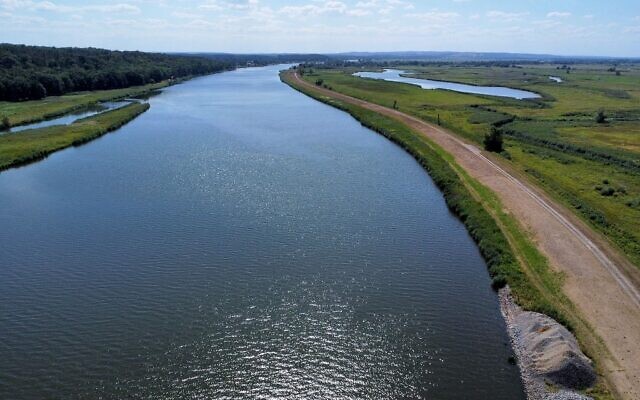
An aerial view taken with a drone shows the river Oder in Schwedt, eastern Germany, on August 12, 2022, after a massive fish kill was discovered in the river in the eastern federal state of Brandenburg, close to the border with Poland.
‘Atypical’
Standing by the riverbank, Michael Tautenhahn, deputy chief of Germany’s Lower Oder Valley National Park, looked in dismay at the river on the German-Polish border.
“We are standing on the German side — we have dead fish everywhere,” he told AFP.
“I am deeply shocked… I have the feeling that I’m seeing decades of work lying in ruins here. I see our livelihood, the water — that’s our life,” he said, noting that it’s not just fish that have died, but also mussels and likely countless other water creatures.
“It’s just the tip of the iceberg.”
The Oder has over the last years been known as a relatively clean river, and 40 domestic species of fish make their home in the waterway.
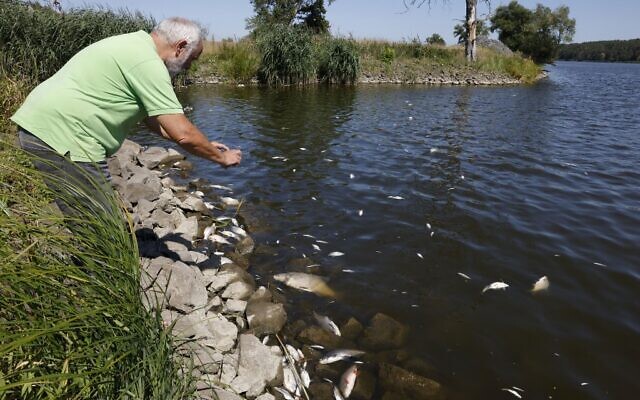
Michael Tautenhahn, deputy leader of the Unteres Odertal national park, takes pictures of dead fish on the banks of the river Oder in Schwedt, eastern Germany, on August 12, 2022, after a massive fish kill was discovered in the river in the eastern federal state of Brandenburg, close to the border with Poland. (Photo by Odd ANDERSEN / AFP)
But now, lifeless fish — some as small as a few centimeters, others reaching 30-40 cm — can be seen across the river. Occasionally, those still struggling to pull through can be seen flipping up in the water, seemingly gasping for air.
Officials believe that the fish are likely to have been poisoned.
“This fish death is atypical,” said Axel Vogel, environment minister for Brandenburg state, estimating that “undoubtedly tonnes” of fish have died.
Fish death is often caused by the distortion of oxygen levels when water levels are too low, he explained.
“But we have completely different test results, namely that we have had increased oxygen level in the river for several days, and that indicates that a foreign substance has been introduced that has led to this,” he said.
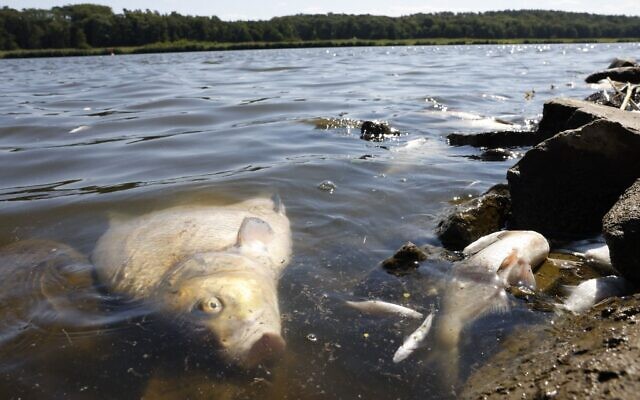
Dead fish on the banks of the river Oder in Schwedt, eastern Germany, on August 12, 2022, after a massive fish kill was discovered in the river in the eastern federal state of Brandenburg, close to the border with Poland. (Photo by Odd ANDERSEN / AFP)
Tests are ongoing in Germany to establish the substance that may have led to the deaths.
Early reports had suggested indications of extremely high levels of mercury. But another batch of preliminary results released on Friday evening showed unusually high levels of salt.
Authorities said they were unconclusive, and that further test results on heavy metals and mercury were pending.
In Poland, prosecutors have also begun investigating after authorities came under fire over what critics said was a sluggish response to a disaster.
Tautenhahn said the disaster would likely carry consequences for years to come.
“If it is quicksilver, then it will also stay here for a long time,” he said, noting that mercury does not disintegrate but would then remain in the sediments.
Thousands of fish wash up dead on banks of Oder river, as Berlin warns of ‘environmental disaster’ and accuses Warsaw of failing to take timely action

Dead fish on the banks of the river Oder in Schwedt, eastern Germany, on August 12, 2022, after a massive fish kill was discovered in the river in the eastern federal state of Brandenburg, close to the border with Poland. (Photo by Odd ANDERSEN / AFP)
SCHWEDT, Germany (AFP) — Thousands of fish have washed up dead on the Oder river running through Germany and Poland, sparking warnings of an environmental disaster as residents are urged to stay away from the water.
The fish floating by the German banks near the eastern town of Schwedt are believed to have washed upstream from Poland, where first reports of mass fish deaths were made by locals and anglers as early as July 28.
German officials accused Polish authorities of failing to inform them about the deaths, and were taken by surprise when the wave of lifeless fish came floating into view.
In Poland, the government has also come under heavy criticism for failing to take swift action.
Almost two weeks after the first dead fish appeared floating by Polish villages, Polish Prime Minister Mateusz Morawiecki said on Friday that “everyone had initially thought that it was a local problem.”
Get The Times of Israel's Daily Editionby email and never miss our top stories
Newsletter email addressGET IT
By signing up, you agree to the terms
But he admitted that the “scale of the disaster is very large, sufficiently large to say that the Oder will need years to recover its natural state.”
“Probably enormous quantities of chemical waste was dumped into the river in full knowledge of the risk and consequences,” added the Polish leader, as German Environment Minister Steffi Lemke urged a comprehensive probe into what she called a brewing “environmental disaster.”

An aerial view taken with a drone shows the river Oder in Schwedt, eastern Germany, on August 12, 2022, after a massive fish kill was discovered in the river in the eastern federal state of Brandenburg, close to the border with Poland.
(Photo by Odd ANDERSEN / AFP)
‘Atypical’
Standing by the riverbank, Michael Tautenhahn, deputy chief of Germany’s Lower Oder Valley National Park, looked in dismay at the river on the German-Polish border.
“We are standing on the German side — we have dead fish everywhere,” he told AFP.
“I am deeply shocked… I have the feeling that I’m seeing decades of work lying in ruins here. I see our livelihood, the water — that’s our life,” he said, noting that it’s not just fish that have died, but also mussels and likely countless other water creatures.
“It’s just the tip of the iceberg.”
The Oder has over the last years been known as a relatively clean river, and 40 domestic species of fish make their home in the waterway.

Michael Tautenhahn, deputy leader of the Unteres Odertal national park, takes pictures of dead fish on the banks of the river Oder in Schwedt, eastern Germany, on August 12, 2022, after a massive fish kill was discovered in the river in the eastern federal state of Brandenburg, close to the border with Poland. (Photo by Odd ANDERSEN / AFP)
But now, lifeless fish — some as small as a few centimeters, others reaching 30-40 cm — can be seen across the river. Occasionally, those still struggling to pull through can be seen flipping up in the water, seemingly gasping for air.
Officials believe that the fish are likely to have been poisoned.
“This fish death is atypical,” said Axel Vogel, environment minister for Brandenburg state, estimating that “undoubtedly tonnes” of fish have died.
Fish death is often caused by the distortion of oxygen levels when water levels are too low, he explained.
“But we have completely different test results, namely that we have had increased oxygen level in the river for several days, and that indicates that a foreign substance has been introduced that has led to this,” he said.

Dead fish on the banks of the river Oder in Schwedt, eastern Germany, on August 12, 2022, after a massive fish kill was discovered in the river in the eastern federal state of Brandenburg, close to the border with Poland. (Photo by Odd ANDERSEN / AFP)
Tests are ongoing in Germany to establish the substance that may have led to the deaths.
Early reports had suggested indications of extremely high levels of mercury. But another batch of preliminary results released on Friday evening showed unusually high levels of salt.
Authorities said they were unconclusive, and that further test results on heavy metals and mercury were pending.
In Poland, prosecutors have also begun investigating after authorities came under fire over what critics said was a sluggish response to a disaster.
Tautenhahn said the disaster would likely carry consequences for years to come.
“If it is quicksilver, then it will also stay here for a long time,” he said, noting that mercury does not disintegrate but would then remain in the sediments.
No comments:
Post a Comment